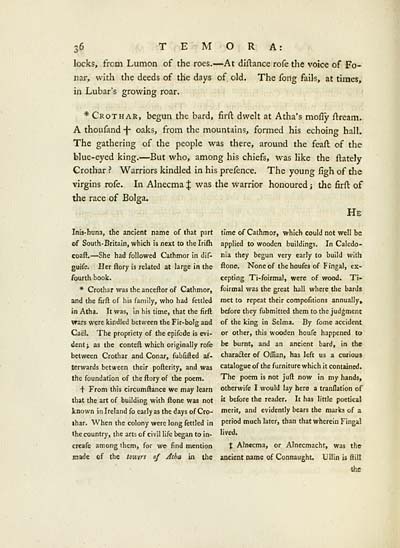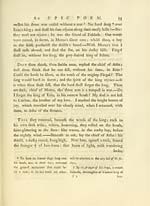Download files
Complete book:
Individual page:
Thumbnail gallery: Grid view | List view

36 T E M
locks, from Lumon of the roes.
liar, with the deeds of the days of old
in Lubar's growing roar.
O R A:
At diftance rofe the voice of Fo-
The fong fails, at times.
* Crothar, begun the bard, firft dwelt at Atha's niofly ftream,
A thoufand -f- oaks, from the mountains, formed his echoing hall.
The gathering of the people was there, around the feafl of the
blue-eyed king. — But who, among his chiefs, was like the ftately
Crothar ? Warriors kindled in his prefence. The young figh of tlie
virgins rofe. In Alnecma J was the warrior honoured ; the firft of
the race of Bolga,
He
Inis-huna, the ancient name of that part
of South-Britain, which is next to thelrifli
coaft, — She had followed Cathmor in dif-
gutfe. Her ftory is related at large in the
fourth book.
* Crothar was the anceftor of Cathmor,
and the firft of his family, who had fettled
in Atha. It was, in his time, that the firft
Vfars were kindled between the Fir-bolg and
Gael. The propriety of the epifode is evi-
dent;, as the conteft which originally rofe
between Crothar and Conar, fubfifled af-
terwards between their pofterity, and was
the foundation of the ftory of the poem.
+ From this circumftance we may learn
that the art of building with ftone was not
known in Ireland fo early as the days of Cro-
ihar. When the colony were long fettled in
the country, the arts of civil life began to in-
creafe among them, for we find mention
made of the iowtrs of Atha in tlic
time of Cathmor, which could not well be
applied to wooden buildings. In Caledo-
nia they begun very early to build with
ftone. None of thehoufesof Fingal, ex-
cepting Ti-foirmal, were of wood. Ti-
foirmal was the great hall where the bards
met to repeat their compofitions annually^
before they fubmitted them to the judgment
of the king in Selma. By fome accident
or other, this wooden houfe happened to
be burnt, and an ancient bard, in the
chara£ler of Offian, has left us a curious
catalogue of the furniture which it contained.
The poem is not Juft now in my hands,
otherwife I would lay here a tranflation of
it before the reader. It has little poetical
merit, and evidently bears the marks of a
period much later, than that wherein Fingal
lived.
\ Afnecma, or Alnecmacht, was the
ancient name of Connaught. Ullin is ftili
the
locks, from Lumon of the roes.
liar, with the deeds of the days of old
in Lubar's growing roar.
O R A:
At diftance rofe the voice of Fo-
The fong fails, at times.
* Crothar, begun the bard, firft dwelt at Atha's niofly ftream,
A thoufand -f- oaks, from the mountains, formed his echoing hall.
The gathering of the people was there, around the feafl of the
blue-eyed king. — But who, among his chiefs, was like the ftately
Crothar ? Warriors kindled in his prefence. The young figh of tlie
virgins rofe. In Alnecma J was the warrior honoured ; the firft of
the race of Bolga,
He
Inis-huna, the ancient name of that part
of South-Britain, which is next to thelrifli
coaft, — She had followed Cathmor in dif-
gutfe. Her ftory is related at large in the
fourth book.
* Crothar was the anceftor of Cathmor,
and the firft of his family, who had fettled
in Atha. It was, in his time, that the firft
Vfars were kindled between the Fir-bolg and
Gael. The propriety of the epifode is evi-
dent;, as the conteft which originally rofe
between Crothar and Conar, fubfifled af-
terwards between their pofterity, and was
the foundation of the ftory of the poem.
+ From this circumftance we may learn
that the art of building with ftone was not
known in Ireland fo early as the days of Cro-
ihar. When the colony were long fettled in
the country, the arts of civil life began to in-
creafe among them, for we find mention
made of the iowtrs of Atha in tlic
time of Cathmor, which could not well be
applied to wooden buildings. In Caledo-
nia they begun very early to build with
ftone. None of thehoufesof Fingal, ex-
cepting Ti-foirmal, were of wood. Ti-
foirmal was the great hall where the bards
met to repeat their compofitions annually^
before they fubmitted them to the judgment
of the king in Selma. By fome accident
or other, this wooden houfe happened to
be burnt, and an ancient bard, in the
chara£ler of Offian, has left us a curious
catalogue of the furniture which it contained.
The poem is not Juft now in my hands,
otherwife I would lay here a tranflation of
it before the reader. It has little poetical
merit, and evidently bears the marks of a
period much later, than that wherein Fingal
lived.
\ Afnecma, or Alnecmacht, was the
ancient name of Connaught. Ullin is ftili
the
Set display mode to: Large image | Transcription
Images and transcriptions on this page, including medium image downloads, may be used under the Creative Commons Attribution 4.0 International Licence unless otherwise stated. ![]()
| Early Gaelic Book Collections > J. F. Campbell Collection > Temora, an ancient epic poem, in eight books > (48) |
|---|
| Permanent URL | https://digital.nls.uk/82178471 |
|---|
| Description | Volumes from a collection of 610 books rich in Highland folklore, Ossianic literature and other Celtic subjects. Many of the books annotated by John Francis Campbell of Islay, who assembled the collection. |
|---|
| Description | Selected items from five 'Special and Named Printed Collections'. Includes books in Gaelic and other Celtic languages, works about the Gaels, their languages, literature, culture and history. |
|---|

